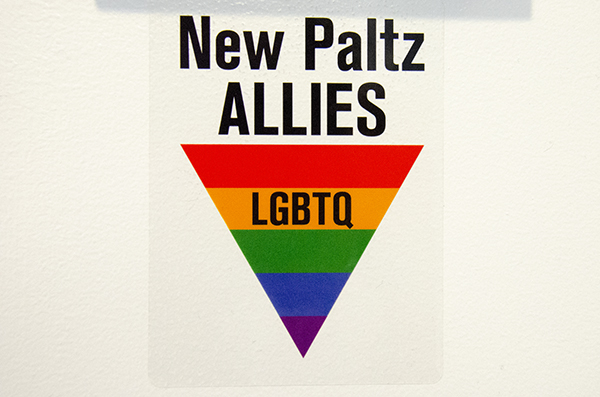

Students and faculty participated in the first orientation for the LGBTQ Allies program on Wednesday, Sept. 25.
The Allies program is one that was “so needed on this campus,” Marcia Tucci, assistant dean of academic advising said.
The Allies resource guide provides a mission statement that includes offering “support, communication and dialogue on issues surrounding sexual orientation and gender identities.”
According to the guide, their aim is to “educate and foster greater respect and understanding for a diverse LGBTQ community,” and work to promote a “safe and inclusive campus.”
The Allies orientation was lead by Tucci, where she guided educational training on terminology — heterosexism, pansexual, gender binary, intersex — the coming out process, gender identity, on campus resources and more.
She also co-facilitated discussions on different LGBTQ populations and various scenarios that students and faculty can reasonably expect to encounter during their time at New Paltz, including “outing” students and staff and respect for other’s identities.
According to Tucci, the first orientation was open to all faculty, staff and students who are residence directors or resident assistants.
Joseph Pine is a graduate student in the Humanist/Multicultural Education program and was a student assistant in the Academic Advising Office for three years as an undergrad. In that time, Pine “had long discussions [with Tucci] about some of the LGBTQ community concerns in New Paltz, as well as how to address them,” Pine said.
Pine, who is also an instructional support technician in the metals program and an assistant coordinator at Oasis/Haven, said he received an email announcing the launch of the program in early September and sent an RSVP to attend the first orientation.
“I think the program was effective in some ways, and still needs some development in others,” Pine said. “The strengths of the program included developing empathy for queer-identified students who need a safe haven and gave participants a look at some of the different issues LGBTQ people face in their daily lives. One of the driving points of the program was understanding when you can, or cannot, be effective as a helper. There was great emphasis placed on referrals and resources.”
The Allies program is currently housed in the Office of Compliance and Campus Climate, but is run solely by volunteers — Tucci and Emma Hempel. Hempel is a graduate student and a Freshmen Admission Advisor.
“[We’re] seeing a kind of issue within the future, this needing a home in the sense of someone who is really responsible for the program, to seeing this program into longevity,” Tucci said. “Otherwise you really only have the strength of the volunteers who’s doing it, and when that person stops, these things can sort of drift away.”
Tucci said she came to President Don Christian and Executive Director of Compliance and Campus Climate, Tanhena Pacheco Dunn and asked for a home for the Allies program.
Finding a place to house the program was necessary, “to give it legitimacy and validity,” Tucci said.
“It was hard to explain to faculty, well, come to this program, we’ll certify you, but we’re not recognized by anyone on campus. That just wasn’t a structure that people were going to have confidence in, that the program was being sponsored by the college” Tucci said.
Pacheco Dunn said she recognized that the Allies Program was about addressing an overall climate issue.
“Even though the Allies program is specifically to help support the LGBTQ community, I think the awareness of how important it is to make this a good experience for that community means that it’s going to be a better experience for everybody,” Pacheco Dunn said.
Pacheco Dunn, who was hired in June 2012, said that while the program is in its infancy, its origins go back to the Task Force on LGBTQ that formed as a response to the October 2011 Campus Climate Survey.
According to Pacheco Dunn, the beginning of the Allies program coincided with the LGBTQ task force.
“It was a question of timing really,” Pacheco Dunn said. “The college had been exploring the Allies program and looking at models that existed on other campuses and the timing of that exploration coincided with the formation of the task force.”
According to Tucci, a copy of the program guide was given to all participants of the orientation.
The guide was compiled from guides and resources at Safe Space and Allies programs at other schools and edited by Tucci and Hemper.
The orientation training lasted an hour and a half. Tucci said it paid particular attention to “troubled areas”— topics in the survey where students displayed a lack of knowledge or understanding. They included the intersex, transgender and bisexual populations, according to Tucci.
Pine said he believes the program is a great start for the New Paltz campus, but also acknowledged that there is too much information concerning LGBTQ issues to cover in a one-day workshop.
“There are whole curricula dedicated to understanding LGBTQ issues, concerns, politics and theory,” Pine said. “This is only one piece of a puzzle that will hopefully begin to come together as attention is drawn to it.”
Tucci said that New Paltz LGBTQ Allies are not experts on LGBTQ issues, nor are they counselors — but they can be a resource.
When a person completes the Allies orientation, they are given a resource guide and a LGBTQ Allies sticker. The sticker “indicates to anyone else in the community that there’s a listening ear, faculty to faculty and student to student,” Tucci said.
The next Allies orientation will be on Friday, Oct. 4. Tucci said she hopes to have a third orientation before the end of the fall semester.
